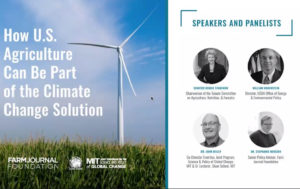 A new report commissioned by Farm Journal Foundation finds U.S. farmers have the potential to significantly reduce their greenhouse gas emissions and become part of the global solution to climate change.
A new report commissioned by Farm Journal Foundation finds U.S. farmers have the potential to significantly reduce their greenhouse gas emissions and become part of the global solution to climate change.
U.S. agriculture contributes about 10% of the total greenhouse gas emissions of the entire national economy, but farmers could greatly reduce those emissions if they were provided with the right government incentives, according to the report, which was co-authored by Dr. John Reilly of MIT’s Joint Program on the Science and Policy of Global Change and Dr. Stephanie Mercier, senior policy adviser at Farm Journal Foundation.
Joining Farm Journal Foundation in releasing the report Thursday were Senate Agriculture Committee Chair Debbie Stabenow (D-MI) and Bill Hohenstein, director of the USDA’s Office of Energy and Environmental Policy.
Sen. Stabenow addressed how the report ties in with the Growing Climate Solutions Act and the importance of increased funding for conservation programs.
Farm Journal Foundation climate report - Sen. Stabenow (2:52)
Bill Hohenstein discussed what USDA is doing to address climate change priorities and the latest progress report on Climate-Smart Agriculture and Forestry.
Farm Journal Foundation climate report - Bill Hohenstein, USDA (8:18)
Hohenstein also commented on how policies such as California’s Low Carbon Fuel Standard help incentivize farmers and biofuel producers to reduce GHG emissions.
Bill Hohenstein, USDA, comments on LCFS and biofuels (1:08)
Report co-author Dr. John Reilly explained how agriculture has the greatest stake in climate change, but also the greatest ability to reduce emissions in a variety of ways.
Farm Journal Foundation climate report - Dr. John Reilly, MIT (7:04)
Dr. Stephanie Mercier talked about policies that can help agriculture be part of the climate change solution.
Farm Journal Foundation climate report - Dr. Stephanie Mercier (8:46)

